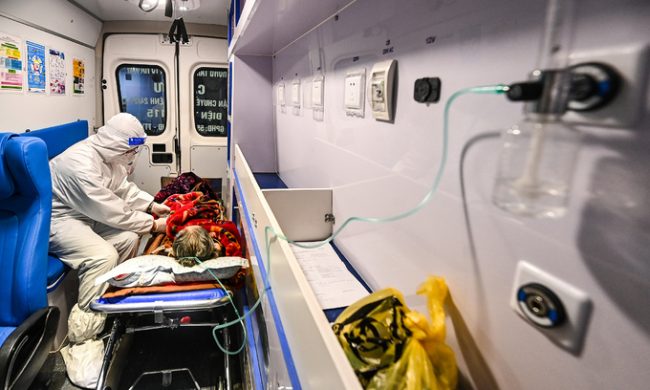According to VnExpress International – With nearly 250 critical Covid patients, Hanoi has adjusted the treatment system to be ready for the situation of 100-500 critical cases per day.
On Feb. 19, Hanoi recorded more than 4,800 new infections, with more than 800 critical cases. This is the highest number of new and critical cases recorded in the city since March 2020.
Among the critical cases, 705 cases had to rely on oxygen masks and 46 cases had to use non-invasive mechanical ventilation, up 27.9 per cent and 120 per cent compared to the average of seven days ago, respectively.
In addition, 19 cases must be on high flow nasal cannula (HFNC), 36 cases of invasive mechanical ventilation, two cases of dialysis, and one case must resort to ECMO.
Hanoi Department of Health has adjusted hospital admission amid the rising number of Covid infections. Hospitals treating moderate to critically ill patients must prepare beds for intensive care.
Duc Giang General Hospital, which has been assigned by the department to take care of critical cases, is treating about 110 Covid patients, receiving an average of 15 severe cases per day. The hospital has about 250 beds in the intensive care unit (ICU) and 150 beds for Covid patients.
Dr Nguyen Thi Lan Huong, deputy director of Thanh Nhan General Hospital, said 140 critical Covid patients are being treated. The hospital receives about 20 severe cases per day and its current number of ICU beds is 250.
Dr Hoang Bui Hai, deputy director of the Hanoi Medical University, said that the number of critical patients has increased rapidly recently.
The hospital has prepared 500 beds, divided into 19 units; each has ICU beds, beds for severe patients, and negative-pressure rooms for special cases. The hospital also deploys a separate air-conditioning system to reduce cross-infection risk for each room.
According to the leaders of these three hospitals, most of the hospitalized patients are elderly with many underlying medical conditions.
They have not been vaccinated or haven’t received enough doses.
Dr Nguyen Van Thuong of Duc Giang General Hospital said many elderly and immunocompromised patients are hospitalized late, so their conditions worsen.
“To reduce the overload of critically ill patients, it is necessary to vaccinate people with booster shots for high-risk groups, and at the same time, maintain good treatment for other patients on other levels,” said Thuong.
Thuong said that Hanoi could still manage the situation.
The number of Covid patients increased, but the number of deaths decreased by 30 per cent compared to the pre-Lunar New Year period.
At that time, Hanoi had 19 deaths per day but now the number is only about 10 cases per day.
He predicts that the number will decrease as more people get vaccinated.
Tran Thi Nhi Ha, director of the Hanoi Health Department, said that nearly 97 per cent of Covid patients were treated at home as they were asymptomatic or had mild symptoms.
Almost 100 per cent of the capital’s population have received two vaccine doses. Therefore, the priority now is to protect people at high risk of contracting Covid and to review those who have not been vaccinated to reduce the rate of severe cases and deaths.
Ha also proposed to change the way to view the pandemic, saying “it is not necessary to publish the number of infections because the number of cases in the community is high.”
The city requires medical facilities and hospitals to ensure beds for moderate-critical patients and prepare for the situation of 100-500 severe cases a day. The municipal health department provides medicine to patients, especially those at home.
The worrying problem is that most Covid-19 patients at hospitals have underlying medical conditions and are prone to sequelae.
The longer the post-Covid syndrome lasts, the weaker patients will be, leading to death.
“These patients need better care when they are negative for coronavirus, but symptoms are still persistent, they need oxygen, as lung damage takes a long time to recover,” said Hai.

